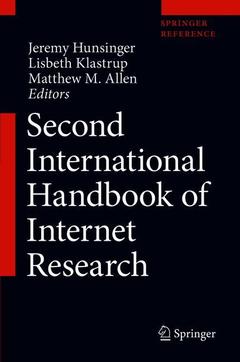Second International Handbook of Internet Research, 1st ed. 2020

Matthew M. Allen is Professor of Internet Studies at Deakin University, Geelong, Australia. Matthew led the establishment of Internet Studies as a teaching and research program within Australia, setting up the first degree programs at undergraduate and postgraduate level at Curtin University in the 1990s and being appointed as Professor of Internet Studies and Head of Department. He is an award-winning educator, a Fellow of the Australian Learning and Teaching Council, and has more than 20 years’ experience and expertise in teaching students via the Internet. He has written widely on topics in this field, focusing primarily on the way in which Internet technologies cannot be used as “tools” to improve learning but are part of the dialogic experience of shared learning and teaching between students and academics. He is also a leading researcher of social consequences and meanings of the Internet, most rece
Date de parution : 10-2019
Ouvrage de 1066 p.
15.5x23.5 cm
